译林版(2020) 选择性必修第一册 Unit 2 The Universal Language Extended Reading课件(34张)
文档属性
| 名称 | 译林版(2020) 选择性必修第一册 Unit 2 The Universal Language Extended Reading课件(34张) | 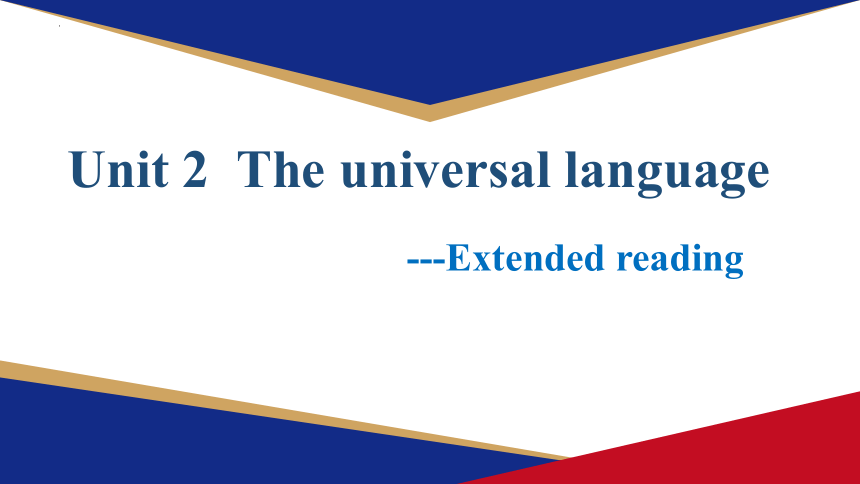 | |
| 格式 | zip | ||
| 文件大小 | 22.7MB | ||
| 资源类型 | 教案 | ||
| 版本资源 | 牛津译林版(2019) | ||
| 科目 | 英语 | ||
| 更新时间 | 2022-05-30 22:08:10 | ||
图片预览

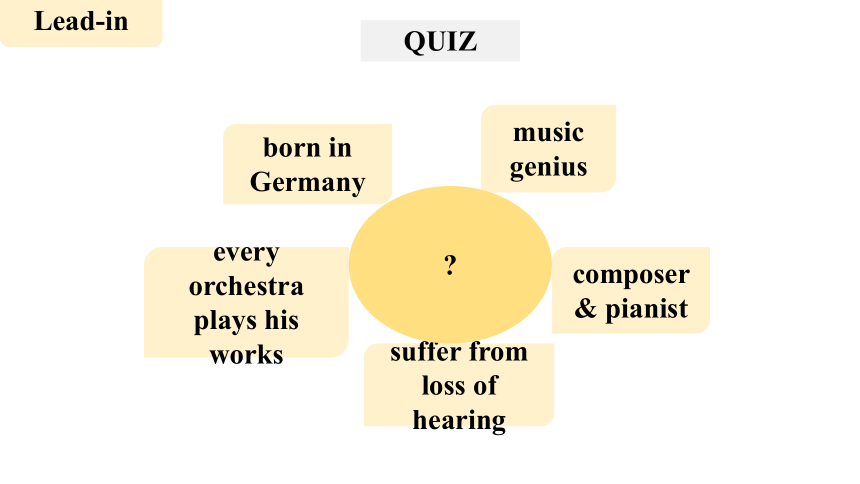
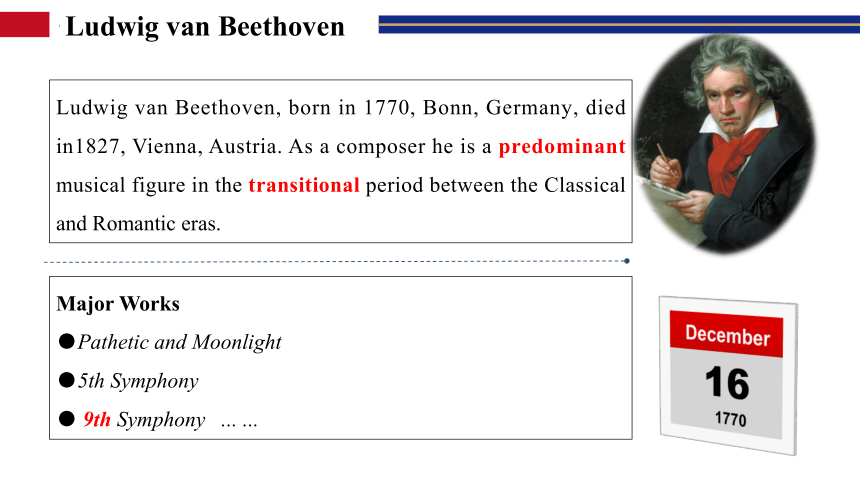
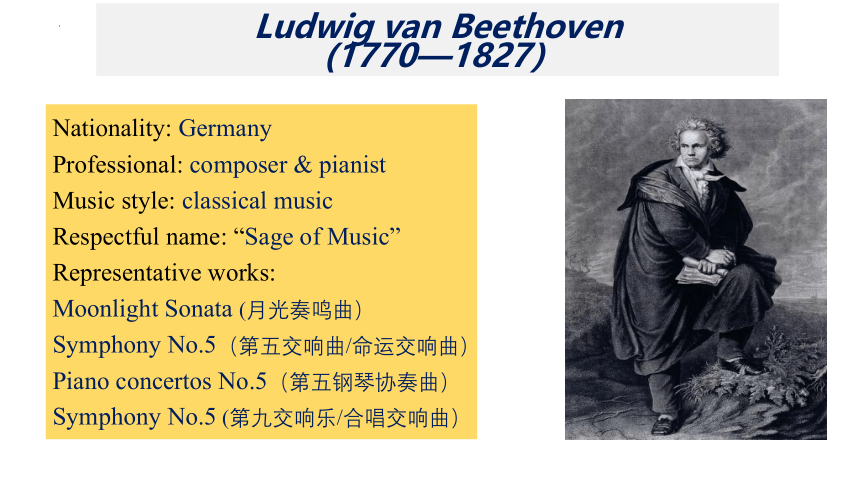
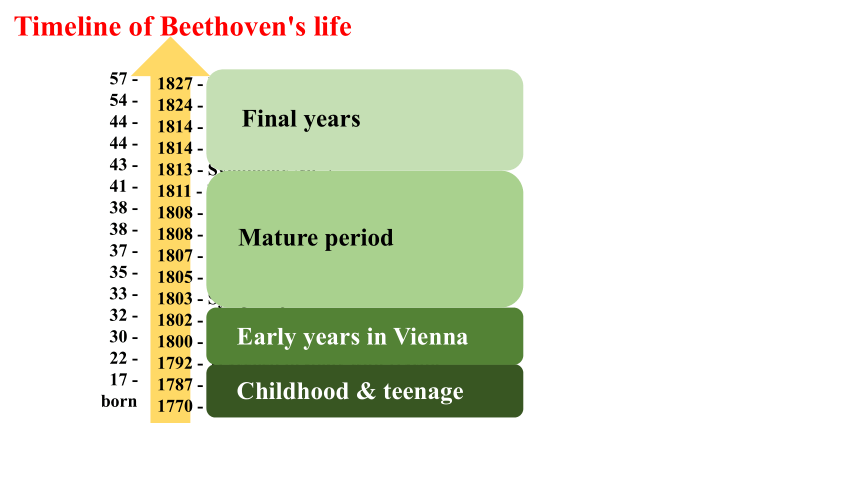

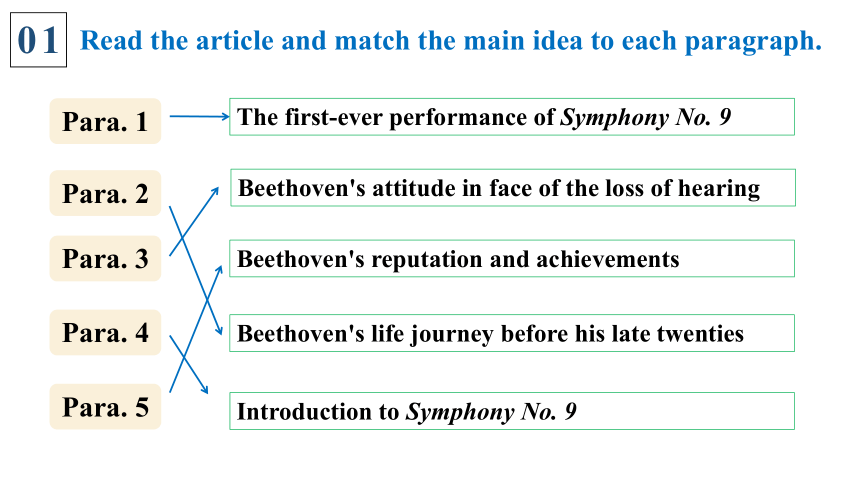
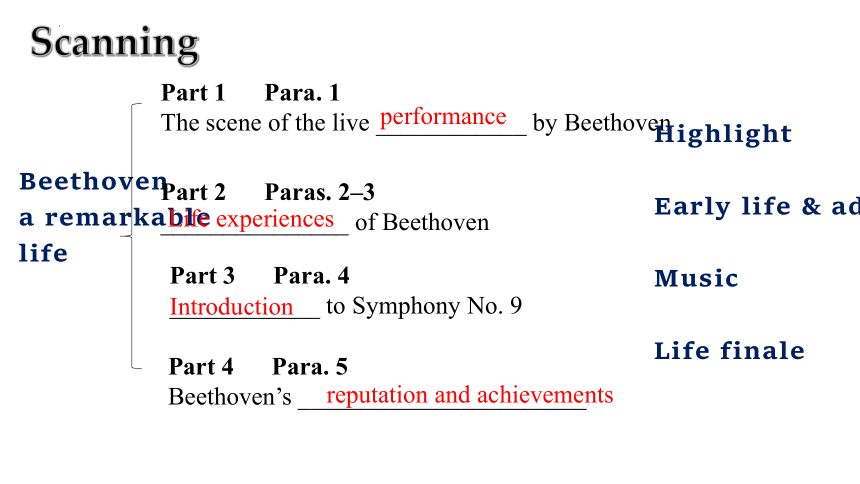
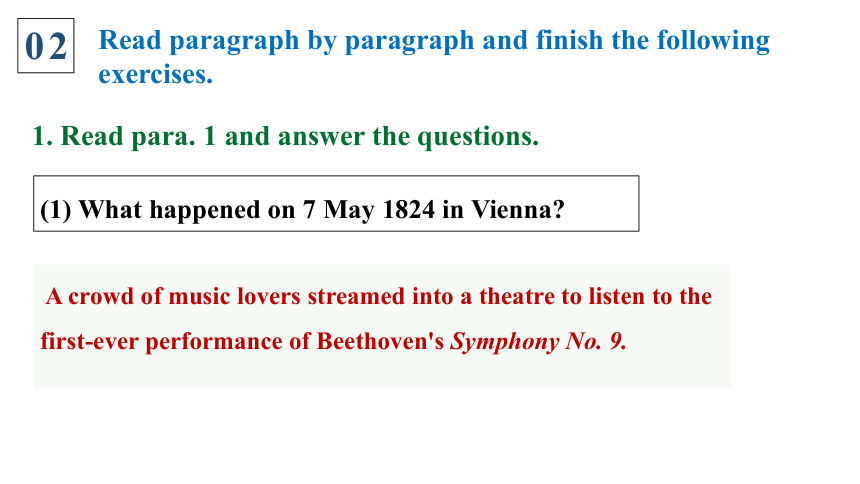

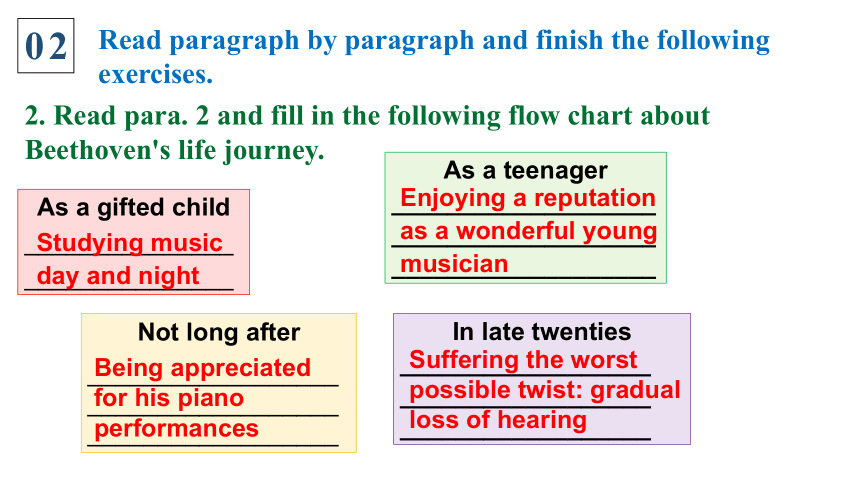
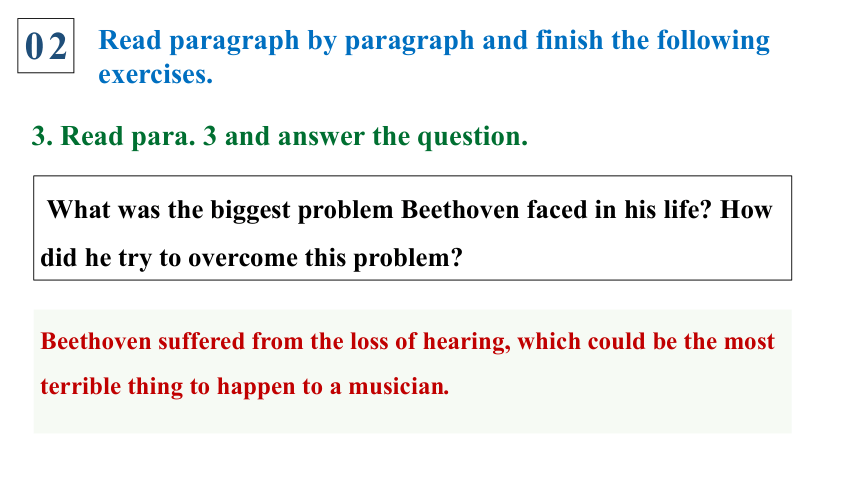
文档简介
(共34张PPT)
Unit 2 The universal language
---Extended reading
born in Germany
every orchestra plays his works
composer & pianist
music genius
suffer from loss of hearing
Lead-in
QUIZ
生年月
Ludwig van Beethoven
Ludwig van Beethoven, born in 1770, Bonn, Germany, died in1827, Vienna, Austria. As a composer he is a predominant musical figure in the transitional period between the Classical and Romantic eras.
Major Works
●Pathetic and Moonlight
●5th Symphony
● 9th Symphony ... ...
Ludwig van Beethoven
(1770—1827)
Nationality: Germany
Professional: composer & pianist
Music style: classical music
Respectful name: “Sage of Music”
Representative works:
Moonlight Sonata (月光奏鸣曲)
Symphony No.5(第五交响曲/命运交响曲)
Piano concertos No.5(第五钢琴协奏曲)
Symphony No.5 (第九交响乐/合唱交响曲)
1827 - Beethoven's death
1824 - Symphony No. 9
1814 - Third and last version of Fidelio
1814 - Symphony No. 8
1813 - Symphony No. 7
1811 - Last public performance
1808 - Symphony No. 6
1808 - Symphony No. 5
1807 - Symphony No. 4
1805 - Symphony No. 3
1803 - Symphony No. 2
1802 - Depression
1800 - Symphony No.1
1792 - Travelled to study with Haydn
1787 - Travelled to Vienna to study with Mozart
1770 - Beethoven was born
Timeline of Beethoven's life
57 -
54 -
44 -
44 -
43 -
41 -
38 -
38 -
37 -
35 -
33 -
32 -
30 -
22 -
17 -
born
Childhood & teenage
Early years in Vienna
Final years
Mature period
Beethoven: a remarkable life
B4U2 Extended Reading
Why
Read the article and match the main idea to each paragraph.
0 1
Para. 1
The first-ever performance of Symphony No. 9
Para. 2
Beethoven's attitude in face of the loss of hearing
Para. 3
Para. 4
Para. 5
Beethoven's reputation and achievements
Beethoven's life journey before his late twenties
Introduction to Symphony No. 9
Beethoven
a remarkable life
Part 1 Para. 1
The scene of the live ____________ by Beethoven
Part 2 Paras. 2–3
_______________ of Beethoven
Part 3 Para. 4
____________ to Symphony No. 9
Part 4 Para. 5
Beethoven’s _______________________
Introduction
reputation and achievements
Scanning
performance
Life experiences
Highlight
Early life & adversity
Music
Life finale
Read paragraph by paragraph and finish the following exercises.
0 2
1. Read para. 1 and answer the questions.
(1) What happened on 7 May 1824 in Vienna
A crowd of music lovers streamed into a theatre to listen to the first-ever performance of Beethoven's Symphony No. 9.
(2) What was wrong with Beethoven at that time
He was almost completely deaf and was unaware of the audience's response.
(3) How did the audience react to Beethoven's performance
They all stood, clapped and waved their hats and handkerchiefs to express their appreciation of Beethoven's masterpiece.
Read paragraph by paragraph and finish the following exercises.
0 2
2. Read para. 2 and fill in the following flow chart about Beethoven's life journey.
As a gifted child
_______________
_______________
As a teenager
___________________
___________________
___________________
Not long after
______________________________________________________
In late twenties
__________________
__________________
__________________
Studying music day and night
Enjoying a reputation as a wonderful young musician
Being appreciated for his piano performances
Suffering the worst possible twist: gradual loss of hearing
Read paragraph by paragraph and finish the following exercises.
0 2
3. Read para. 3 and answer the question.
What was the biggest problem Beethoven faced in his life How did he try to overcome this problem
Beethoven suffered from the loss of hearing, which could be the most terrible thing to happen to a musician.
To overcome this problem, he used a variety of hearing aids. He would put one end of a pencil in his mouth and place the other end against the instrument. In this way, he could feel the notes.
Para. 4
Read paragraph by paragraph and finish the following exercises.
0 2
4. Read para. 4 and complete the notes
Beethoven's Symphony No. 9
About the first movement
The first movement starts quietly, but _____________________ the whole orchestra breaks into an ________ theme.
You can soon feel the _____________coursing through the music.
all of a sudden/
suddenly
energetic
determination
About the second and third movements
They are full of ______________ and ______________ , reflecting his _________ and __________.
The music moves through technically difficult sections __________ , showing his genius as a composer.
About the fourth movement
All the differnet variations are connected into final ____________.
desperate lows
uplifting highs
suffering
strong will
with ease
joyful chorus
0 3
How does the author introduce the topic
The author introduces the topic by using flashback. The author chooses one of the most important moments in Beethoven’s career to introduce the topic.
flashback
In some texts, the events are not put exactly in time order; instead, an event that happened earlier is put in the middle of the main story, which is called flashback.
There is usually a transitional sentence indicating the change.
Critical thinking
On 7 May 1824, a crowd of music lovers streamed into a theatre in Vienna to hear ... Beethoven’s Symphony No. 9 (Para. 1)
Symphony No. 9 was Beethoven’s last major piece of music in ... (Para. 2)
When Beethoven presented Symphony No. 9 in Vienna in 1824, it was his first time ... (Para. 3)
Since that day, Beethoven’s Symphony No. 9 has become one of the most famous and treasured pieces ... (Para. 4)
As Beethoven’s last great work, his Symphony No. 9 was also a grand finale to his life ... (Para. 5)
Symphony No. 9
1.What the use of Symphony No.9 in this article
string
⑤
③
①
④
②
Symphony No. 9
Why does the author choose
Symphony No. 9 as the string of the whole passage
●last major piece of music
●one of the most famous pieces in the history of classical music
●showing Beethoven’s genius
●indicating twists and turns of the musician’s life and reflecting his strong will
Find out Beethoven’s qualities as a musician by adding adjectives to the following chart.
Qualities of Beethoven
optimistic
devoted
determined
talented
passionate
intelligent
diligent
persistent
creative
…
Discussion
我要扼住命运的喉咙,它将无法使我完全屈服。——路德维希·凡·贝多芬
a crowd of
stream into
the first-ever performance
break into enthusiastic cheers
be unaware of
enjoy a reputation
a sharp turn
keep it a secret
be determined to do
desperate lows and uplifting highs
a grand finale to his life
1.一大群,许多的 L1
2. 涌入 L1
3. 首次表演 L2
爆发出热情的欢呼 L4
没有意识到 L5
享有名誉 L12
厄运突至 L15
保守秘密 L19
下定决心做某事 L23
10. 绝望的低声部和激越的高声部 L36
11. 人生绝唱 L40
Important expression
硕士阶段
科研
Language points
1. stream v. 流,流动,涌动;n. 小溪,人流,车流
e.g Tears streamed down his face. 泪水顺着他的脸往下流。
Cars filed past in an endless stream. 汽车川流不息,鱼贯而过。
2. gifted adj. 有天赋的
* be gifted with... 具有...
* talented; have a gift / talent for...
e.g She has a great gift for music. 她极有音乐天赋。
硕士阶段
科研
Language points
3. reputation n. 名声,名誉
* have a reputation for sth/doing sth/as...
e.g She soon acquired a reputation as a first-class cook.
她不久就获得了顶级厨师的名声。
4. depress v. 使抑郁;使沮丧
* n. depression 抑郁
e.g There was a feeling of depression in the office when the news of the job cuts was announced. 裁员消息宣布时办公室里一片沮丧的气氛。
硕士阶段
科研
Language points
5. upset adj. 难过的,沮丧的;v. 使烦恼,扰乱
* be upset about sth/that...
e.g There’s no point getting upset about it. 犯不着为此事难过
6. possess v. 拥有
* n. possession 拥有,财产;in possession of... 拥有...
e.g Those documents are now in the possession of the Washington Post.
那些文件现在归《华盛顿邮报》所有。
硕士阶段
科研
Language points
7. despite prep. 尽管,即使
* in spite of...
e.g She was good at physics despite the fact that she found it boring.
尽管她认为物理枯燥无味,她却学得很好。
8. a variety of... 种类繁多的
* various adj. 多种多样的
There is a wide variety of patterns to choose from.
有种类繁多的图案可供选择。
硕士阶段
科研
Language points
9. … how could I possibly admit a weakness in the one sense 【which should be more perfect in me than in others】, a sense 【which I once possessed in the greatest perfection】 …
定语从句
定语从句
……这样一种在我身上本应比别人更加完美的感官,这样一种我曾经拥有绝顶禀赋的感官,如今怎能让我承认它有了缺陷……
硕士阶段
科研
Language points
10. When composing music at the piano, he would put one end of a pencil in his mouth and place the other end against the instrument so that he could feel the notes.
目的状语从句
连词+V-ing结构,相当于when he composed...
When reading the novel, the boy became so absorbed that he didn't notice the teacher came near.
那男孩读小说时太专心了,没有注意到老师走了过来。
I. Phrases :
1.涌入
2.突然开始
3. 不知道
4.人山人海
5. 享有…盛名
6.二十大几岁
7. 吸收
8. 突然
stream into
break into
be unaware of
a sea of people
enjoy a reputation as
in one’s late twenties
take in
all of a sudden
9. 人生绝唱
10.被视为
11.高度评价(p.20)
12.本打算做…(p.20)
13.厌倦(p.20)
14.出现(p.20)
15.能够做… (p.21)
16.开始做… (p.21)
a grand finale to one’s life
be regarded as
think highly of
had intended to
get tired of
show up
be capable of
get down to doing
17.盯着看(p.23)
18.屏住呼吸(p.23)
19.迫不及待做… (p.23)
20. 使…醉心(p.23)
21. 陪同某人经历… (p.23)
22 . 展望(p.23)
23.反思(p.23)
stare at
hold one’s breath
can’t wait to do…
sweep sb along
accompany sb through
look to
reflect on
THANK YOU
Unit 2 The universal language
---Extended reading
born in Germany
every orchestra plays his works
composer & pianist
music genius
suffer from loss of hearing
Lead-in
QUIZ
生年月
Ludwig van Beethoven
Ludwig van Beethoven, born in 1770, Bonn, Germany, died in1827, Vienna, Austria. As a composer he is a predominant musical figure in the transitional period between the Classical and Romantic eras.
Major Works
●Pathetic and Moonlight
●5th Symphony
● 9th Symphony ... ...
Ludwig van Beethoven
(1770—1827)
Nationality: Germany
Professional: composer & pianist
Music style: classical music
Respectful name: “Sage of Music”
Representative works:
Moonlight Sonata (月光奏鸣曲)
Symphony No.5(第五交响曲/命运交响曲)
Piano concertos No.5(第五钢琴协奏曲)
Symphony No.5 (第九交响乐/合唱交响曲)
1827 - Beethoven's death
1824 - Symphony No. 9
1814 - Third and last version of Fidelio
1814 - Symphony No. 8
1813 - Symphony No. 7
1811 - Last public performance
1808 - Symphony No. 6
1808 - Symphony No. 5
1807 - Symphony No. 4
1805 - Symphony No. 3
1803 - Symphony No. 2
1802 - Depression
1800 - Symphony No.1
1792 - Travelled to study with Haydn
1787 - Travelled to Vienna to study with Mozart
1770 - Beethoven was born
Timeline of Beethoven's life
57 -
54 -
44 -
44 -
43 -
41 -
38 -
38 -
37 -
35 -
33 -
32 -
30 -
22 -
17 -
born
Childhood & teenage
Early years in Vienna
Final years
Mature period
Beethoven: a remarkable life
B4U2 Extended Reading
Why
Read the article and match the main idea to each paragraph.
0 1
Para. 1
The first-ever performance of Symphony No. 9
Para. 2
Beethoven's attitude in face of the loss of hearing
Para. 3
Para. 4
Para. 5
Beethoven's reputation and achievements
Beethoven's life journey before his late twenties
Introduction to Symphony No. 9
Beethoven
a remarkable life
Part 1 Para. 1
The scene of the live ____________ by Beethoven
Part 2 Paras. 2–3
_______________ of Beethoven
Part 3 Para. 4
____________ to Symphony No. 9
Part 4 Para. 5
Beethoven’s _______________________
Introduction
reputation and achievements
Scanning
performance
Life experiences
Highlight
Early life & adversity
Music
Life finale
Read paragraph by paragraph and finish the following exercises.
0 2
1. Read para. 1 and answer the questions.
(1) What happened on 7 May 1824 in Vienna
A crowd of music lovers streamed into a theatre to listen to the first-ever performance of Beethoven's Symphony No. 9.
(2) What was wrong with Beethoven at that time
He was almost completely deaf and was unaware of the audience's response.
(3) How did the audience react to Beethoven's performance
They all stood, clapped and waved their hats and handkerchiefs to express their appreciation of Beethoven's masterpiece.
Read paragraph by paragraph and finish the following exercises.
0 2
2. Read para. 2 and fill in the following flow chart about Beethoven's life journey.
As a gifted child
_______________
_______________
As a teenager
___________________
___________________
___________________
Not long after
______________________________________________________
In late twenties
__________________
__________________
__________________
Studying music day and night
Enjoying a reputation as a wonderful young musician
Being appreciated for his piano performances
Suffering the worst possible twist: gradual loss of hearing
Read paragraph by paragraph and finish the following exercises.
0 2
3. Read para. 3 and answer the question.
What was the biggest problem Beethoven faced in his life How did he try to overcome this problem
Beethoven suffered from the loss of hearing, which could be the most terrible thing to happen to a musician.
To overcome this problem, he used a variety of hearing aids. He would put one end of a pencil in his mouth and place the other end against the instrument. In this way, he could feel the notes.
Para. 4
Read paragraph by paragraph and finish the following exercises.
0 2
4. Read para. 4 and complete the notes
Beethoven's Symphony No. 9
About the first movement
The first movement starts quietly, but _____________________ the whole orchestra breaks into an ________ theme.
You can soon feel the _____________coursing through the music.
all of a sudden/
suddenly
energetic
determination
About the second and third movements
They are full of ______________ and ______________ , reflecting his _________ and __________.
The music moves through technically difficult sections __________ , showing his genius as a composer.
About the fourth movement
All the differnet variations are connected into final ____________.
desperate lows
uplifting highs
suffering
strong will
with ease
joyful chorus
0 3
How does the author introduce the topic
The author introduces the topic by using flashback. The author chooses one of the most important moments in Beethoven’s career to introduce the topic.
flashback
In some texts, the events are not put exactly in time order; instead, an event that happened earlier is put in the middle of the main story, which is called flashback.
There is usually a transitional sentence indicating the change.
Critical thinking
On 7 May 1824, a crowd of music lovers streamed into a theatre in Vienna to hear ... Beethoven’s Symphony No. 9 (Para. 1)
Symphony No. 9 was Beethoven’s last major piece of music in ... (Para. 2)
When Beethoven presented Symphony No. 9 in Vienna in 1824, it was his first time ... (Para. 3)
Since that day, Beethoven’s Symphony No. 9 has become one of the most famous and treasured pieces ... (Para. 4)
As Beethoven’s last great work, his Symphony No. 9 was also a grand finale to his life ... (Para. 5)
Symphony No. 9
1.What the use of Symphony No.9 in this article
string
⑤
③
①
④
②
Symphony No. 9
Why does the author choose
Symphony No. 9 as the string of the whole passage
●last major piece of music
●one of the most famous pieces in the history of classical music
●showing Beethoven’s genius
●indicating twists and turns of the musician’s life and reflecting his strong will
Find out Beethoven’s qualities as a musician by adding adjectives to the following chart.
Qualities of Beethoven
optimistic
devoted
determined
talented
passionate
intelligent
diligent
persistent
creative
…
Discussion
我要扼住命运的喉咙,它将无法使我完全屈服。——路德维希·凡·贝多芬
a crowd of
stream into
the first-ever performance
break into enthusiastic cheers
be unaware of
enjoy a reputation
a sharp turn
keep it a secret
be determined to do
desperate lows and uplifting highs
a grand finale to his life
1.一大群,许多的 L1
2. 涌入 L1
3. 首次表演 L2
爆发出热情的欢呼 L4
没有意识到 L5
享有名誉 L12
厄运突至 L15
保守秘密 L19
下定决心做某事 L23
10. 绝望的低声部和激越的高声部 L36
11. 人生绝唱 L40
Important expression
硕士阶段
科研
Language points
1. stream v. 流,流动,涌动;n. 小溪,人流,车流
e.g Tears streamed down his face. 泪水顺着他的脸往下流。
Cars filed past in an endless stream. 汽车川流不息,鱼贯而过。
2. gifted adj. 有天赋的
* be gifted with... 具有...
* talented; have a gift / talent for...
e.g She has a great gift for music. 她极有音乐天赋。
硕士阶段
科研
Language points
3. reputation n. 名声,名誉
* have a reputation for sth/doing sth/as...
e.g She soon acquired a reputation as a first-class cook.
她不久就获得了顶级厨师的名声。
4. depress v. 使抑郁;使沮丧
* n. depression 抑郁
e.g There was a feeling of depression in the office when the news of the job cuts was announced. 裁员消息宣布时办公室里一片沮丧的气氛。
硕士阶段
科研
Language points
5. upset adj. 难过的,沮丧的;v. 使烦恼,扰乱
* be upset about sth/that...
e.g There’s no point getting upset about it. 犯不着为此事难过
6. possess v. 拥有
* n. possession 拥有,财产;in possession of... 拥有...
e.g Those documents are now in the possession of the Washington Post.
那些文件现在归《华盛顿邮报》所有。
硕士阶段
科研
Language points
7. despite prep. 尽管,即使
* in spite of...
e.g She was good at physics despite the fact that she found it boring.
尽管她认为物理枯燥无味,她却学得很好。
8. a variety of... 种类繁多的
* various adj. 多种多样的
There is a wide variety of patterns to choose from.
有种类繁多的图案可供选择。
硕士阶段
科研
Language points
9. … how could I possibly admit a weakness in the one sense 【which should be more perfect in me than in others】, a sense 【which I once possessed in the greatest perfection】 …
定语从句
定语从句
……这样一种在我身上本应比别人更加完美的感官,这样一种我曾经拥有绝顶禀赋的感官,如今怎能让我承认它有了缺陷……
硕士阶段
科研
Language points
10. When composing music at the piano, he would put one end of a pencil in his mouth and place the other end against the instrument so that he could feel the notes.
目的状语从句
连词+V-ing结构,相当于when he composed...
When reading the novel, the boy became so absorbed that he didn't notice the teacher came near.
那男孩读小说时太专心了,没有注意到老师走了过来。
I. Phrases :
1.涌入
2.突然开始
3. 不知道
4.人山人海
5. 享有…盛名
6.二十大几岁
7. 吸收
8. 突然
stream into
break into
be unaware of
a sea of people
enjoy a reputation as
in one’s late twenties
take in
all of a sudden
9. 人生绝唱
10.被视为
11.高度评价(p.20)
12.本打算做…(p.20)
13.厌倦(p.20)
14.出现(p.20)
15.能够做… (p.21)
16.开始做… (p.21)
a grand finale to one’s life
be regarded as
think highly of
had intended to
get tired of
show up
be capable of
get down to doing
17.盯着看(p.23)
18.屏住呼吸(p.23)
19.迫不及待做… (p.23)
20. 使…醉心(p.23)
21. 陪同某人经历… (p.23)
22 . 展望(p.23)
23.反思(p.23)
stare at
hold one’s breath
can’t wait to do…
sweep sb along
accompany sb through
look to
reflect on
THANK YOU
同课章节目录
- Unit 1 Food matters
- Welcome to the unit
- Reading
- Grammar and usage
- Integrated skills
- Extended reading
- Project
- Unit 2 The Universal Language
- Welcome to the unit
- Reading
- Grammar and usage
- Integrated skills
- Extended reading
- Project
- Unit 3 The art of painting
- Welcome to the unit
- Reading
- Grammar and usage
- Integrated skills
- Extended reading
- Project
- Unit 4 Exploring poetry
- Welcome to the unit
- Reading
- Grammar and usage
- Integrated skills
- Extended reading
- Project
